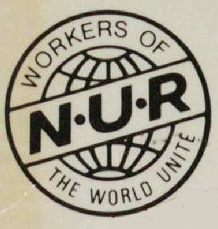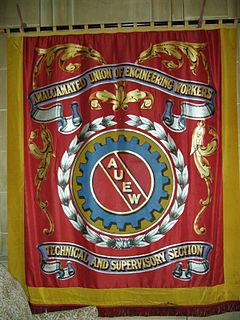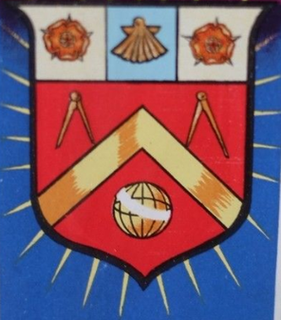
The Transport Salaried Staffs' Association (TSSA) is a trade union for workers in the transport and travel industries in the United Kingdom and Ireland. Its head office is in London, and it has regional offices in Bristol, Derby, Dublin, Manchester, York and Glasgow.

The National Union of Seamen (NUS) was the principal trade union of merchant seafarers in the United Kingdom from the late 1880s to 1990. In 1990, the union amalgamated with the National Union of Railwaymen to form the National Union of Rail, Maritime and Transport Workers (RMT).

The National Union of Railwaymen was a trade union of railway workers in the United Kingdom. The largest railway workers' union in the country, it was influential in the national trade union movement.

The Technical, Administrative and Supervisory Section (TASS) was a British trade union.
The Workers' Union was a general union based in the United Kingdom, but with some branches in other countries. During the 1910s, it was the largest general union in the UK, but it entered a rapid decline in the 1920s, and eventually became part of the Transport and General Workers' Union (TGWU).
The Association of Supervisory Staffs, Executives and Technicians (ASSET), was a British trade union, chiefly representing supervisors in the metal working and transport industries. It was formed from the National Foremen's Association, founded in 1918.

The Association of Professional, Executive, Clerical and Computer Staff (APEX) was a British trade union which represented clerical and administrative employees.

The Iron and Steel Trades Confederation (ISTC) was a British trade union for metal-workers and allied groups, being the largest union in these fields. It was formed on 1 January 1917 as a merger of existing steel-workers' unions and it is now part of Community.

The Union of Construction, Allied Trades and Technicians (UCATT) was a British and Irish trade union, operating in the construction industry. It was founded in 1971, and merged into Unite on 1 January 2017.

The Amalgamated Engineering Union (AEU) was a major British trade union. It merged with the Electrical, Electronic, Telecommunications and Plumbing Union to form the Amalgamated Engineering and Electrical Union in 1992.

The Electrical, Electronic, Telecommunications and Plumbing Union, known as the EETPU, was a British trade union formed in 1968 as a union for electricians and plumbers, which went through three mergers from 1992 to now be part of Unite the Union.

The National Union of Agricultural and Allied Workers (NUAW) was a trade union in the United Kingdom which existed between 1906 and 1982. It represented farmworkers.

The Amalgamated Society of Woodworkers (ASW) was a British trade union representing carpenters, joiners and allied trades. The ASW was formed in 1921 by the amalgamation of two smaller unions. It was itself merged into the Union of Construction, Allied Trades and Technicians in 1971.

The Amalgamated Society of Boilermakers, Shipwrights, Blacksmiths and Structural Workers (ASB) was a trade union in the United Kingdom. Many of its members worked in shipbuilding, in which industry it was the leading trade union, while over time it also developed strength in engineering and construction.

The Amalgamated Union of Building Trade Workers (AUBTW) was a British trade union.

The Furniture, Timber and Allied Trades Union (FTAT) was a trade union in the United Kingdom.

The Confederation of Shipbuilding and Engineering Unions (CSEU), often known as the Confed is a trade union confederation in the United Kingdom.

The National Union of Boot and Shoe Operatives (NUBSO) was a trade union in the United Kingdom which existed between 1873 and 1971. It represented workers in the footwear industry.
The Constructional Engineering Union (CEU) was a trade union representing steel erectors and other workers involved in steel construction in the United Kingdom.

The Electrical Trades Union (ETU) was a trade union representing electricians in the United Kingdom, much of its membership consisting of wiring fitters and telephone engineers.

















